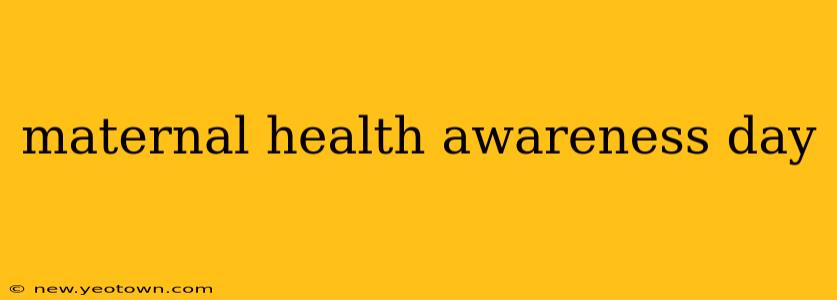Every year on May 1st, we commemorate Maternal Health Awareness Day. It’s not just a date on the calendar; it’s a powerful reminder of the incredible strength of mothers worldwide and the urgent need to improve their health and well-being. This isn't just about statistics; it's about the stories of mothers, their journeys, and the challenges they face. Let's delve into the heart of this important day.
Imagine Abeni, a young mother in a rural village in Nigeria. She's expecting her second child, but access to quality healthcare is a distant dream. Her first pregnancy was fraught with complications, and the fear of history repeating itself hangs heavy in the air. Abeni's story, sadly, is shared by millions of women across the globe. Maternal mortality remains a stark reality, a tragic consequence of preventable causes.
What is Maternal Mortality?
Maternal mortality refers to the death of a woman during pregnancy, childbirth, or within six weeks after delivery. This isn't merely a number; it's a life cut short, leaving behind children, families, and communities shattered. The causes are complex and interconnected, often stemming from a lack of access to essential healthcare services.
What are the Main Causes of Maternal Mortality?
This is a critical question, and understanding the root causes is essential for effective intervention.
H2: What are the leading causes of maternal death worldwide?
The leading causes are often intertwined and include:
- Hemorrhage (severe bleeding): This accounts for a significant percentage of maternal deaths, often preventable with timely medical intervention.
- Hypertensive disorders of pregnancy (pre-eclampsia and eclampsia): These conditions can lead to seizures, organ damage, and death if not managed effectively.
- Infections (sepsis): Infections during pregnancy or childbirth can rapidly become life-threatening if not treated promptly.
- Obstructed labor: This occurs when the baby cannot pass through the birth canal, requiring immediate medical intervention, often a cesarean section.
- Unsafe abortions: Lack of access to safe and legal abortion services leads to many preventable deaths.
H2: What role does poverty play in maternal mortality?
Poverty significantly exacerbates the risk of maternal mortality. Limited access to healthcare, nutritious food, and sanitation increases the vulnerability of pregnant women. Women in impoverished communities often lack the resources to seek necessary medical care, resulting in preventable complications.
H2: How can we improve maternal health globally?
Improving maternal health is a multifaceted challenge that requires a concerted global effort. This includes:
- Increased access to quality healthcare: This involves investing in healthcare infrastructure, training healthcare professionals, and ensuring access to essential medicines and supplies.
- Empowering women: Educating women about their reproductive health, empowering them to make informed decisions, and ensuring their participation in healthcare planning are crucial.
- Improving nutrition: Ensuring access to nutritious food during pregnancy helps reduce the risk of complications.
- Promoting family planning: Access to family planning services allows women to space their pregnancies and plan their families according to their own wishes.
- Addressing harmful traditional practices: Challenging harmful cultural practices that endanger women's health is essential.
Abeni's story, and the stories of millions like her, highlight the urgent need for improved maternal health. Maternal Health Awareness Day is a call to action, a reminder that every mother deserves the chance to experience a safe and healthy pregnancy and childbirth. By working together, we can create a world where every mother's journey is one of strength, hope, and survival. Let's make this a reality.

